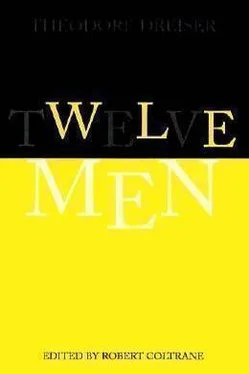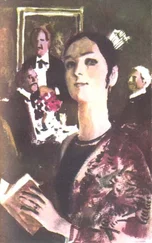Теодор Драйзер - Twelve Men
Здесь есть возможность читать онлайн «Теодор Драйзер - Twelve Men» весь текст электронной книги совершенно бесплатно (целиком полную версию без сокращений). В некоторых случаях можно слушать аудио, скачать через торрент в формате fb2 и присутствует краткое содержание. Год выпуска: 2014, Издательство: epubBooks Classics, Жанр: Биографии и Мемуары, на английском языке. Описание произведения, (предисловие) а так же отзывы посетителей доступны на портале библиотеки ЛибКат.
- Название:Twelve Men
- Автор:
- Издательство:epubBooks Classics
- Жанр:
- Год:2014
- ISBN:нет данных
- Рейтинг книги:4 / 5. Голосов: 1
-
Избранное:Добавить в избранное
- Отзывы:
-
Ваша оценка:
- 80
- 1
- 2
- 3
- 4
- 5
Twelve Men: краткое содержание, описание и аннотация
Предлагаем к чтению аннотацию, описание, краткое содержание или предисловие (зависит от того, что написал сам автор книги «Twelve Men»). Если вы не нашли необходимую информацию о книге — напишите в комментариях, мы постараемся отыскать её.
Twelve Men — читать онлайн бесплатно полную книгу (весь текст) целиком
Ниже представлен текст книги, разбитый по страницам. Система сохранения места последней прочитанной страницы, позволяет с удобством читать онлайн бесплатно книгу «Twelve Men», без необходимости каждый раз заново искать на чём Вы остановились. Поставьте закладку, и сможете в любой момент перейти на страницу, на которой закончили чтение.
Интервал:
Закладка:
"Wash your toes, can't you? Wash your toes! Can't you wash your toes?"
The skilled gentleman, realizing that he was now living under very different conditions from those to which presumably he was accustomed, reached down and began to rub the tops of his toes but without any desire apparently to widen the operation.
"Here!" called the host, this time much more sharply, "I said wash your toes, not the outside of them! Soap them! Don't you know how to wash your toes yet? You're old enough, God knows! Wash between 'em! Wash under 'em!"
"Certainly I know how to wash my toes," replied the other irritably and straightening up, "and what's more, I'd like you to know that I am a gentleman."
"Well, then, if you're a gentleman," retorted the other, "you ought to know how to wash your toes. Wash 'em—and don't talk back!"
"Pah!" exclaimed the bather now, looking twice as ridiculous as before. "I'm not used to having such language addressed to me."
"I can't help that," said Culhane. "If you knew how to wash your toes perhaps you wouldn't have to have such language addressed to you."
"Oh, hell!" fumed the other. "This is positively outrageous! I'll leave the place, by George!"
"Very well," rejoined the other, "only before you go you'll have to wash your toes!"
And he did, the host standing by and calmly watching the performance until it was finally completed.
It was just this atmosphere which made the place the most astonishing in which I have ever been. It seemed to be drawing the celebrated and the successful as a magnet might iron, and yet it offered conditions which one might presume they would be most opposed to. No one here was really any one, however much he might be outside. Our host was all. He had a great blazing personality which dominated everybody, and he did not hesitate to show before one and all that he did so do.
Breakfast here consisted of a cereal, a chop and coffee—plentiful but very plain, I thought. After breakfast, between eight–thirty and eleven, we were free to do as we chose: write letters, pack our bags if we were leaving, do up our laundry to be sent out, read, or merely sit about. At eleven, or ten–thirty, according to the nature of the exercise, one had to join a group, either one that was to do the long or short block, as they were known here, or one that was to ride horseback, all exercises being so timed that by proper execution one would arrive at the bathroom door in time to bathe, dress and take ten minutes' rest before luncheon. These exercises were simple enough in themselves, consisting, as they did in the case of the long and the short blocks (the long block seven, the short four miles in length), of our walking, or walking and running betimes, about or over courses laid up hill and down dale, over or through unpaved mudroads in many instances, along dry or wet beds of brooks or streams, and across stony or weedy fields, often still damp with dew or the spring rains. But in most cases, when people had not taken any regular exercise for a long time, this was by no means easy. The first day I thought I should never make it, and I was by no means a poor walker. Others, the new ones especially, often gave out and had to be sent for, or came in an hour late to be most severely and irritatingly ragged by the host. He seemed to all but despise weakness and had apparently a thousand disagreeable ways of showing it.
"If you want to see what poor bags of mush some people can become," he once said in regard to some poor specimen who had seemingly had great difficulty in doing the short block, "look at this. Here comes a man sent out to do four measly country miles in fifty minutes, and look at him. You'd think he was going to die. He probably thinks so himself. In New York he'd do seventeen miles in a night running from barroom to barroom or one lobster palace to another—that's a good name for them, by the way—and never say a word. But out here in the country, with plenty of fresh air and a night's rest and a good breakfast, he can't even do four miles in fifty minutes! Think of it! And he probably thinks of himself as a man—boasts before his friends, or his wife, anyhow. Lord!"
A day or two later there arrived here a certain major of the United States Army, a large, broad–chested, rather pompous person of about forty–eight or –nine, who from taking his ease in one sinecure and another had finally reached the place where he was unable to endure certain tests (or he thought so) which were about to be made with a view to retiring certain officers grown fat in the service. As he explained to Culhane, and the latter was always open and ribald afterward in his comments on those who offered explanations of any kind, his plan was to take the course here in order to be able to make the difficult tests later.
Culhane resented this, I think. He resented people using him or his methods to get anywhere, do anything more in life than he could do, and yet he received them. He felt, and I think in the main that he was right, that they looked down on him because of his lowly birth and purely material and mechanical career, and yet having attained some distinction by it he could not forego this work which raised him, in a way, to a position of dominance over these people. Now the sight of presumably so efficient a person in need of aid or exercise, to be built up, was all that was required to spur him on to the most waspish or wolfish attitude imaginable. In part at least he argued, I think (for in the last analysis he was really too wise and experienced to take any such petty view, although there is a subconscious "past–lack" motivating impulse in all our views), that here he was, an ex–policeman, ex–wrestler, ex–prize fighter, ex–private, ex–waiter, beef–carrier, bouncer, trainer; and here was this grand major, trained at West Point, who actually didn't know any more about life or how to take care of his body than to be compelled to come here, broken down at forty–eight, whereas he, because of his stamina and Spartan energy, had been able to survive in perfect condition until sixty and was now in a position to rebuild all these men and wastrels and to control this great institution. And to a certain extent he was right, although he seemed to forget or not to know that he was not the creator of his own great strength, by any means, impulses and tendencies over which he had no control having arranged for that.
However that may be, here was the major a suppliant for his services, and here was he, Culhane, and although the major was paying well for his minute room and his probably greatly decreased diet, still Culhane could not resist the temptation to make a show of him, to picture him as the more or less pathetic example that he was, in order perhaps that he, Culhane, might shine by contrast. Thus on the first day, having sent him around the short block with the others, it was found at twelve, when the "joggers" were expected to return, and again at twelve–thirty when they were supposed to take their places at the luncheon table, that the heavy major had not arrived. He had been seen and passed by all, of course. After the first mile or two probably he had given out and was making his way as best he might up hill and down dale, or along some more direct road, to the "shop," or maybe he had dropped out entirely, as some did, via a kindly truck or farmer's wagon, and was on his way to the nearest railway station.
At any rate, as Culhane sat down at his very small private table, which stood in the center of the dining–room and far apart from the others (a vantage point, as it were), he looked about and, not seeing the new guest, inquired, "Has any one seen that alleged army officer who arrived here this morning?"
No one could say anything more than that they had left him two or three miles back.
"I thought so," he said tersely. "There you have a fine example of the desk general and major—we had 'em in the army—men who sit in a swivel chair all day, wear a braided uniform and issue orders to other people. You'd think a man like that who had been trained at West Point and seen service in the Philippines would have sense enough to keep himself in condition. Not at all. As soon as they get a little way up in their profession they want to sit around hotel grills or society ballrooms and show off, tell how wonderful they are. Here's a man, an army officer, in such rotten shape that if I sent a good horse after him now it's ten to one he couldn't get on him. I'll have to send a truck or some such thing."
Читать дальшеИнтервал:
Закладка:
Похожие книги на «Twelve Men»
Представляем Вашему вниманию похожие книги на «Twelve Men» списком для выбора. Мы отобрали схожую по названию и смыслу литературу в надежде предоставить читателям больше вариантов отыскать новые, интересные, ещё непрочитанные произведения.
Обсуждение, отзывы о книге «Twelve Men» и просто собственные мнения читателей. Оставьте ваши комментарии, напишите, что Вы думаете о произведении, его смысле или главных героях. Укажите что конкретно понравилось, а что нет, и почему Вы так считаете.









